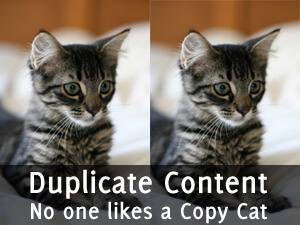 I mentioned yesterday I’m reading Andy Crestodina’s “Content Chemistry.”
I mentioned yesterday I’m reading Andy Crestodina’s “Content Chemistry.”
It’s an interesting book that is half theory and half lab; full of tips, cautions and notes for even the most sophisticated content marketer.
If you’ve ever seen Andy speak or read his blog (or read his guest posts here), you’ll know you’re going to learn something from the first page (or you’ll discover it when you attend his Spin Sucks Pro webinar this Thursday).
He’s very, very good and his book is no different.
PR Firm Gets Client’s Site Blacklisted
In it he tells a story about a client that launched a website and hired a PR firm to announce the new site (that strategy, in and of itself, isn’t a great one, but it’s not my point) and to create new content to help with search rankings.
Rather than write an original news release, though, the PR firm simply copied the text from the website’s home page and submitted it to the online newswires.
Oh yes. They copied the text from the website’s home page as their “news release” (I seriously hate PR people sometimes; more on that here). What is wrong with people? Can you imagine paying for a PR firm to do that? I’d be furious.
But I’d be even more furious when I discovered what happened next.
Because the wires automatically post to websites around the globe, within minutes there were more than 1,000 instances of that home page content on the web.
Duplicate content is a big no-no for the Google algorithms, s0 the site was flagged as likely spam and they blacklisted the domain. Suddenly the website dropped from search results, even when you typed in the exact company name.
Yes, when you typed in the company name, their website didn’t pop up in search results.
Can you imagine?
The natural inclination, of course, is to blame the web firm when your site disappears from search rankings, but it turns out it was not the fault of Andy or his team at Orbit, but that of the client’s PR firm.
The story ends well. This time.
Because Orbit has a great reputation for building “white hat” websites, they were able to file a reconsideration request and explain what happened. Google reinstated the website, and all was well.
But imagine if this happened to you and you didn’t have access to a reputable firm with tentacles into Google. Not good.
Duplicate Content and Search Rankings
This, of course, wouldn’t have happened if the PR firm had oh, I don’t know, written a news release that was actually news and something journalists and bloggers would have been happy to use because it told a story.
But nooooo. They took this poor client’s money, copied their home page content, posted it on the wires, and called it a job well done.
People! For the love of all things great, please understand the basics of how Google works.
The number one rule: You cannot have the same content on multiple pages.
Of course, there are exceptions to the rule.
For instance, if your site is syndicated, or an industry publication likes to use your content (PR Daily and Ragan use our content sometimes once a week), a simple, “This post first appeared on XX site” and link to the original post will do.
Google understands, then, there is an authoritative post (typically the original one) and a secondary post (typically the syndicated one).
But, let’s say you have two pages on your site that have the same content: One is singular (public relations firm) and the other is plural (public relations firms).
Google will strike both of those pages out of its search results and lower the site’s overall rankings.
It used to be common SEO practice to do this, and to use the same content on both pages, so check your sites and those of your clients.
Make sure there isn’t any duplicate content anywhere.
Five Content + SEO Tutorials
If you don’t understand how all of this works, there are plenty of places to get help.
- Install Yoast or the All-in-One SEO pack to your website and/or blog. These will teach you how to optimize, prevent too many keywords, and nip duplicate content as you write.
- Subscribe to, and read religiously, SEOmoz.
- Subscribe to, and read religiously, anything from Content Marketing Institute.
- Set up a Google alert for “content marketing + SEO” and read anything it pulls back for you.
- Attend webinars that talk about content marketing and SEO.
Don’t let Andy’s client’s nightmare happen to you. It’s completely preventable.
To play it safe, make sure everything you write – and post to a site or blog – is new and original and that you optimize it well.
If you do those two things, Google will love your site forever and ever.